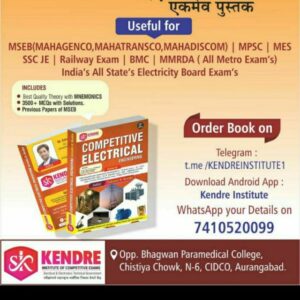
DAMS eMedicoz OFFICIAL
Official channel to share updates regarding NEETPG NEXT FMGE and tips & strategy. Subscribe to the channel to get daily quizzes and updates.
Recent Posts
DAMS Question Bank (DQB) - I (Anatomy, Biochemistry, Physiology) 1st Year MBBS
Amazon URL - https://shorturl.at/zPWgQ
DAMS eMedicoz App - https://play.google.com/store/apps/details?id=com.emedicoz.app
Amazon URL - https://shorturl.at/zPWgQ
DAMS eMedicoz App - https://play.google.com/store/apps/details?id=com.emedicoz.app
PYQ KA BAAP 3.0 Ultimate Revision Session for INICET May 2025 | Orthopaedics || Dr. Tushar Metha
We’re thrilled to invite you to join our Ambassador Program for 2025! As an ambassador, you'll enjoy exclusive group discounts on courses, mentor juniors and guide them about using the courses for their studies, you're interested in this exciting opportunity, please let us know.
https://forms.gle/FJb26wwo997JQo5H6
https://forms.gle/FJb26wwo997JQo5H6
Must watch video for all 3rd Year & Final Year MBBS Students, wilt daily blueprint, MCQ solving and Testing Targets by Mentor Duo https://www.youtube.com/live/UjSLSKWeLV0?si=dLZivLRvhq68pi6y
Bias
Dr. Deepti:
Another sneaky villain? Prejudice.
Thinking, “Oh, this can’t be asked in INICET—it’s too basic,” or “This won’t be asked in FMGE.” That mindset leads you to underrate the question or even skip it in preparation.
Every subject is important. Every question is valid.
____________________________________
📌 Final Thoughts: Fix the Fixable
Dr. Sumer:
So let’s summarize the main causes of silly mistakes:
1. Knowledge gaps or poor revision
2. Overthinking on direct questions
3. Underthinking on indirect ones
4. Skipping key parts like the last line
5. Mental fatigue or lack of practice
6. Prejudices and assumptions about the exam pattern
And the best part? All of these are correctable.
____________________________________
🧘♀️ Becoming a Better Version Every Day
Dr. Deepti:
I want to leave you with this:
We are all works in progress. Making mistakes is okay—but repeating them without learning? That’s not okay.
I keep this on my phone case—it says, "Becoming the better version of yourself." That’s our mantra. Every day, every test, every revision—make progress.
Dr. Sumer:
Absolutely. You’ve got the same brain that Einstein had. Just tell yourself, I want to improve. Let’s break the loop of silly mistakes and rise above.
____________________________________
💬 Drop a comment if you're ready to say it aloud:
"I want to improve. I want to be a better version of myself every single day."
With warmth and faith in your journey,
Dr. Sumer Sethi & Dr. Deepti Bahl
Team DAMS
Dr. Deepti:
Another sneaky villain? Prejudice.
Thinking, “Oh, this can’t be asked in INICET—it’s too basic,” or “This won’t be asked in FMGE.” That mindset leads you to underrate the question or even skip it in preparation.
Every subject is important. Every question is valid.
____________________________________
📌 Final Thoughts: Fix the Fixable
Dr. Sumer:
So let’s summarize the main causes of silly mistakes:
1. Knowledge gaps or poor revision
2. Overthinking on direct questions
3. Underthinking on indirect ones
4. Skipping key parts like the last line
5. Mental fatigue or lack of practice
6. Prejudices and assumptions about the exam pattern
And the best part? All of these are correctable.
____________________________________
🧘♀️ Becoming a Better Version Every Day
Dr. Deepti:
I want to leave you with this:
We are all works in progress. Making mistakes is okay—but repeating them without learning? That’s not okay.
I keep this on my phone case—it says, "Becoming the better version of yourself." That’s our mantra. Every day, every test, every revision—make progress.
Dr. Sumer:
Absolutely. You’ve got the same brain that Einstein had. Just tell yourself, I want to improve. Let’s break the loop of silly mistakes and rise above.
____________________________________
💬 Drop a comment if you're ready to say it aloud:
"I want to improve. I want to be a better version of myself every single day."
With warmth and faith in your journey,
Dr. Sumer Sethi & Dr. Deepti Bahl
Team DAMS
The Pathogenesis of Silly Mistakes – A Conversation with Dr. Sumer Sethi and Dr. Deepti Bahl🔥
“Become a better version of yourself – every single day.”
Dr. Sumer Sethi:
Today, we’re going to talk about something really close to all our hearts—the pathogenesis of silly mistakes. Yes, those tiny errors that sneak into our exam papers and mess with our ranks. And yet, they are so fixable once you understand the why behind them.
Dr. Deepti Bahl:
Good morning, dear students! We know that this topic resonates with everyone. Whether you’re a topper or just starting your prep, silly mistakes are a common challenge. But here’s the good news: silly mistakes can be prevented.
Let’s begin by setting the context. Modern exams—whether NEET PG, INICET, or FMGE—are no longer about obscure, out-of-the-world questions. They’re doable, as so many top-rankers tell us. The real determinant of your rank now is how well you can avoid silly mistakes.
____________________________________
🎯 Understanding Why We Make Silly Mistakes
Dr. Deepti:
Let’s start with the first step: critical analysis. Let’s say you did 5 MCQs and got one wrong. The usual defense mechanism? “Oh, it was just a silly mistake.”
But is it really?
I want you to pause and analyze:
• Did I actually know the concept?
• Was I aware of the difference between two closely related terms?
Often, it’s not a silly mistake—it’s a gap in content knowledge or a lack of revision. Let me give you an example from obstetrics. Students often confuse carboprost with dinoprostone. They’re both prostaglandins, but with very different uses. If you don’t know that, it’s not a silly mistake—it’s a knowledge gap.
____________________________________
🧠 Reason 1: Lack of Knowledge or Revision
Dr. Sumer:
Absolutely. Many times, what we label as a silly mistake is actually a lack of recall due to insufficient revision. You read it somewhere, but you can’t recall it when it matters. That’s a revision issue.
And don’t forget fatigue. If you’re not conditioned to sit through 200 MCQs with full focus, you're going to slip up—especially in the last 20-30 questions.
____________________________________
🤯 Reason 2: Overthinking on Exam Day
Dr. Deepti:
Yes! A very common trap. You see a direct question that’s clearly from your notes or class—and then you begin to doubt it.
“Wait… why is it this easy? Is this a trap?”
And then you overthink, ignore your instincts, and go with a wrong option.
Rule of thumb? If it’s a direct question, trust your first instinct. Don’t let exam pressure push you toward a weird-looking option or longer sentence.
____________________________________
🧩 Reason 3: Underthinking on Indirect Questions
Dr. Sumer:
On the flip side, indirect or tricky clinical questions need you to pause, eliminate options, and think logically.
Here’s a method:
• Eliminate the definitely wrong ones
• Use educated guessing only when you're down to two
• Improve the probability in your favor (60-40, not 50-50)
This is not guessing—it’s reasoned deduction based on everything you’ve studied.
____________________________________
🔍 Reason 4: Skipping the Last Line
Dr. Deepti:
Raise your hand if you’ve ever read a whole question, skipped the last line, and chose the wrong answer.
That last line often has the crucial detail—like “EXCEPT,” or a finding that completely flips the diagnosis.
One trick? Read the question aloud in your mind and translate into your mother tongue side-by-side. It slows your brain just enough to catch those vital words.
____________________________________
🛑 Reason 5: Fatigue and Mental Endurance
Dr. Sumer:
Let’s not ignore the elephant in the room: fatigue.
You’re focused for the first 100 MCQs. Then slowly, your mind drifts. You make silly errors not because you didn’t know—but because your brain gave up before you did.
So what’s the solution? Stamina training.
• Build endurance with shorter tests first
• Graduate to full grand tests
• Take walks, move your body—build cognitive stamina
____________________________________
💡 Reason 6: Prejudice and Pattern
“Become a better version of yourself – every single day.”
Dr. Sumer Sethi:
Today, we’re going to talk about something really close to all our hearts—the pathogenesis of silly mistakes. Yes, those tiny errors that sneak into our exam papers and mess with our ranks. And yet, they are so fixable once you understand the why behind them.
Dr. Deepti Bahl:
Good morning, dear students! We know that this topic resonates with everyone. Whether you’re a topper or just starting your prep, silly mistakes are a common challenge. But here’s the good news: silly mistakes can be prevented.
Let’s begin by setting the context. Modern exams—whether NEET PG, INICET, or FMGE—are no longer about obscure, out-of-the-world questions. They’re doable, as so many top-rankers tell us. The real determinant of your rank now is how well you can avoid silly mistakes.
____________________________________
🎯 Understanding Why We Make Silly Mistakes
Dr. Deepti:
Let’s start with the first step: critical analysis. Let’s say you did 5 MCQs and got one wrong. The usual defense mechanism? “Oh, it was just a silly mistake.”
But is it really?
I want you to pause and analyze:
• Did I actually know the concept?
• Was I aware of the difference between two closely related terms?
Often, it’s not a silly mistake—it’s a gap in content knowledge or a lack of revision. Let me give you an example from obstetrics. Students often confuse carboprost with dinoprostone. They’re both prostaglandins, but with very different uses. If you don’t know that, it’s not a silly mistake—it’s a knowledge gap.
____________________________________
🧠 Reason 1: Lack of Knowledge or Revision
Dr. Sumer:
Absolutely. Many times, what we label as a silly mistake is actually a lack of recall due to insufficient revision. You read it somewhere, but you can’t recall it when it matters. That’s a revision issue.
And don’t forget fatigue. If you’re not conditioned to sit through 200 MCQs with full focus, you're going to slip up—especially in the last 20-30 questions.
____________________________________
🤯 Reason 2: Overthinking on Exam Day
Dr. Deepti:
Yes! A very common trap. You see a direct question that’s clearly from your notes or class—and then you begin to doubt it.
“Wait… why is it this easy? Is this a trap?”
And then you overthink, ignore your instincts, and go with a wrong option.
Rule of thumb? If it’s a direct question, trust your first instinct. Don’t let exam pressure push you toward a weird-looking option or longer sentence.
____________________________________
🧩 Reason 3: Underthinking on Indirect Questions
Dr. Sumer:
On the flip side, indirect or tricky clinical questions need you to pause, eliminate options, and think logically.
Here’s a method:
• Eliminate the definitely wrong ones
• Use educated guessing only when you're down to two
• Improve the probability in your favor (60-40, not 50-50)
This is not guessing—it’s reasoned deduction based on everything you’ve studied.
____________________________________
🔍 Reason 4: Skipping the Last Line
Dr. Deepti:
Raise your hand if you’ve ever read a whole question, skipped the last line, and chose the wrong answer.
That last line often has the crucial detail—like “EXCEPT,” or a finding that completely flips the diagnosis.
One trick? Read the question aloud in your mind and translate into your mother tongue side-by-side. It slows your brain just enough to catch those vital words.
____________________________________
🛑 Reason 5: Fatigue and Mental Endurance
Dr. Sumer:
Let’s not ignore the elephant in the room: fatigue.
You’re focused for the first 100 MCQs. Then slowly, your mind drifts. You make silly errors not because you didn’t know—but because your brain gave up before you did.
So what’s the solution? Stamina training.
• Build endurance with shorter tests first
• Graduate to full grand tests
• Take walks, move your body—build cognitive stamina
____________________________________
💡 Reason 6: Prejudice and Pattern
Get 40% Discount on BACK TO BASICS Course for NEET PG
TRANSFORM 10X TARGETS
Everyone should give the GYNAE clinical vignette test and let me know your score
Everyone should give the GYNAE clinical vignette test and let me know your score
SYNAPSE Connections in Medical Sciences for NEXT
Amazon URL - https://shorturl.at/7KBTM
DAMS eMedicoz App - https://play.google.com/store/apps/details?id=com.emedicoz.app
Amazon URL - https://shorturl.at/7KBTM
DAMS eMedicoz App - https://play.google.com/store/apps/details?id=com.emedicoz.app
Live Now
DAMS eMedicoz OFFICIAL pinned «»
IS IndoSurgicals Silvery III-SS Stethoscope (BLACK)
DAMS eMedicoz App - https://play.google.com/store/apps/details?id=com.emedicoz.app
DAMS eMedicoz App - https://play.google.com/store/apps/details?id=com.emedicoz.app
INICET Predictor Series | Medicine (Resp/Abb) || Dr. Bharath Kathi
PYQ KA BAAP 3.0 Ultimate Revision Session for INICET May 2025 | Biochemistry || Dr. Sonam Bhatia
2nd Year MBBS Live Class On eMedicoz App and Live on DAMS YouTube Channel | Microbiology || Dr. J. Suria Kumar





